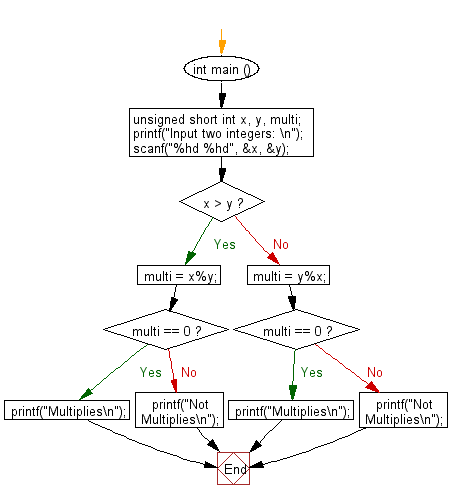C Exercises: Test two integers are multiply or not
C Basic Declarations and Expressions: Exercise-103 with Solution
Write a C program that takes two integers and test whether they are multiplies are not.
In science, a multiple is the product of any quantity and an integer. In other words, for the quantities a and b, we say that b is a multiple of a if b = na for some integer n, which is called the multiplier. If a is not zero, this is equivalent to saying that b/a is an integer.
Sample Solution:
C Code:
#include <stdio.h>
int main () {
unsigned short int x, y, multi;
printf("Input two integers: \n");
scanf("%hd %hd", &x, &y);
if (x > y){
multi = x%y;
if ( multi == 0){
printf("Multiplies\n");
}
else{
printf("Not Multiplies\n");
}
}
else{
multi = y%x;
if (multi == 0){
printf("Multiplies\n");
}
else{
printf("Not Multiplies\n");
}
}
}
Sample Output:
Input two integers: 3 9 Multiplies
Flowchart:

C programming Code Editor:
Contribute your code and comments through Disqus.
Previous: Write a C program that reads three integers and sort the numbers in ascending order. Print the original numbers and sorted numbers.
Next: Write a C program that read the item’s price and create new item price and increased price of that item according to the item price table.
What is the difficulty level of this exercise?
Test your Programming skills with w3resource's quiz.
C Programming: Tips of the Day
Static variable inside of a function in C
The scope of variable is where the variable name can be seen. Here, x is visible only inside function foo().
The lifetime of a variable is the period over which it exists. If x were defined without the keyword static, the lifetime would be from the entry into foo() to the return from foo(); so it would be re-initialized to 5 on every call.
The keyword static acts to extend the lifetime of a variable to the lifetime of the programme; e.g. initialization occurs once and once only and then the variable retains its value - whatever it has come to be - over all future calls to foo().
Ref : https://bit.ly/3fOq7XP
- New Content published on w3resource:
- HTML-CSS Practical: Exercises, Practice, Solution
- Java Regular Expression: Exercises, Practice, Solution
- Scala Programming Exercises, Practice, Solution
- Python Itertools exercises
- Python Numpy exercises
- Python GeoPy Package exercises
- Python Pandas exercises
- Python nltk exercises
- Python BeautifulSoup exercises
- Form Template
- Composer - PHP Package Manager
- PHPUnit - PHP Testing
- Laravel - PHP Framework
- Angular - JavaScript Framework
- Vue - JavaScript Framework
- Jest - JavaScript Testing Framework
